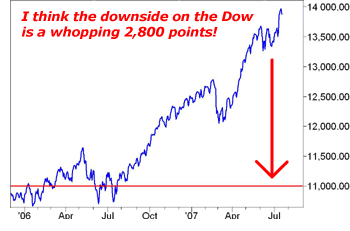Investing - Steer clear of the US. Stock Market; Look to Asia!
Stock-Markets / Asian Economies Jul 19, 2007 - 10:35 AM GMT I'm in Asia right now. And I can tell you first hand that things here are as vibrant as ever.
I'm in Asia right now. And I can tell you first hand that things here are as vibrant as ever.
There's been no change in the spectacular fundamentals underlying this region. With the exception of Thailand, almost all Asian countries are exploding with economic growth. For example, Singapore's second-quarter economic stats just blew away expectations, with GDP rising 8.5%.
All this growth has two important results:
1. Asian stock markets, while also a bit more volatile right now, are in strong long-term bull markets. So unlike the U.S., I continue to recommend Asia stock markets!
2. Most of the natural resource bull markets are also very much intact. I'm talking about oil, gold, base metals, and foods. Huge demand for natural resources — mostly coming from Asia — virtually guarantees higher prices to come for the world's most precious resources.
Indeed, just look at the price of oil, which continues to soar. As I noted last week, I would not be surprised to see $100-a-barrel oil before the end of the year.
In fact, it seems the International Energy Administration (IEA) now agrees with me on the oil crisis. Last week, in a seminal report, the IEA published an analysis unequivocally forecasting that the world faces a massive energy crisis within five years! [Editor's note: For more on this, see Sean's article, " Profit from Oil's Next Surge ."]
Considering the IEA is late to the game and normally very conservative, I say beware: A massive energy crisis, where oil prices could hit $150 a barrel and gas could reach $5 a gallon, could arrive sooner rather than later.
Meanwhile …
Although the U.S. Stock Market Has Rallied Strongly, Don't Be Fooled
With rare exceptions, nearly all of my indicators on the U.S. markets are turning south.
Even though U.S. stocks appear strong, I don't like the downside risk. At best, I think the Dow can get as high as 14,500, for an additional 700-point gain. On the other hand, I put the downside at 11,000, a whopping 2,800-point fall.

Put another way, the Dow's downside risk is now four times greater than the upside potential. That's not the kind of market you want to be in!
In my opinion, most U.S. stocks are overvalued right now. They're trading at the kind of price-to-earnings ratios we saw back in the heyday of the bull market, just before the 2001 collapse.
Moreover, I can't understand why anyone would want to invest heavily in the U.S economy right now. Not only is it very weak, but there are also two other problems.
First, the U.S. dollar's prospects are horrible.
Short-term, the dollar is at a record low against the euro … a 15-year low against the British pound … a 30-year low against the Canadian dollar … an 18-year low against the Australian dollar … and even at a 10-year low against the Thai baht, a country that is still under military rule from a recent coup.
That's what's happening right now. Longer-term, other than a temporary bounce here and there, the dollar is still toast. That's because the U.S. government is now nearly $9 trillion in debt … because the U.S. economy is so weak … and because our trade deficit with the world continues to break record after record.
Plus, our Federal Reserve is caught between a rock and a hard place. They can't raise rates for fear of causing the U.S. economy to completely collapse. And they can't push rates down, either — out of fear of causing a total collapse in the U.S. dollar.
Bottom line: The U.S. dollar is in for a long-term decline that could see its value fall much more against nearly all other currencies. The only questions that remain are how much and how fast?
I can't answer those two questions. But I can say that the dollar's poor outlook is one more reason to stay away from most U.S. stocks. And to instead opt for foreign markets and natural resources, both of which will act as a hedge against a weakening dollar.
Second, our central bank continues to print money and credit like there's no tomorrow. That threatens to send the value and purchasing power of the U.S. dollar even lower . It also virtually guarantees that inflation in the U.S. will continue to rise.
I've told you in recent issues how some measures of consumer price inflation in the U.S. already suggest that overall price levels are rising at 7% or 8%. And don't be surprised if you see inflation running at more like 11% or 12% by next year.
I think you get the picture about why the U.S. is a risky bet right now. But just to bring home my point about how much better Asian stocks are doing, I want to leave you with a table. It shows the performance of 13 Asian stocks I mentioned here in Money & Markets in June 2006 …
| Company | Symbol | Total Return (6/15/06 - 7/17/07) |
| Sinopec Shanghai | SHI | 43.72% |
| CNOOC, Ltd. | CEO | 61.50% |
| Petrochina | PTR | 57.78% |
| Santos Ltd. | STOSY | 42.73% |
| China Pet. & Chem. | SNP | 110.95% |
| Alumina Ltd. | AWC | 55.45% |
| Aluminum Corp. | ACH | 170.01% |
| Posco | PKX | 144.58% |
| Amcor Ltd. | AMCR | 23.37%* |
| Kubota Corp. | KUB | -2.35% |
| Korea Electric Power | KEP | 34.29% |
| Huaneng Power Intl. | HNP | 84.32% |
| Mitsui & Co. | MITSY | 73.39% |
* — as of June 13, 2007, last available data date
As you can see, many of these stocks have been doing quite well. And if what I'm seeing here in Asia is any indicator, there are plenty more gains ahead for these foreign shares.
Best wishes,
By Larry Edelson
This investment news is brought to you by Money and Markets . Money and Markets is a free daily investment newsletter from Martin D. Weiss and Weiss Research analysts offering the latest investing news and financial insights for the stock market, including tips and advice on investing in gold, energy and oil. Dr. Weiss is a leader in the fields of investing, interest rates, financial safety and economic forecasting. To view archives or subscribe, visit http://www.moneyandmarkets.com .
Money and Markets Archive |
© 2005-2022 http://www.MarketOracle.co.uk - The Market Oracle is a FREE Daily Financial Markets Analysis & Forecasting online publication.



